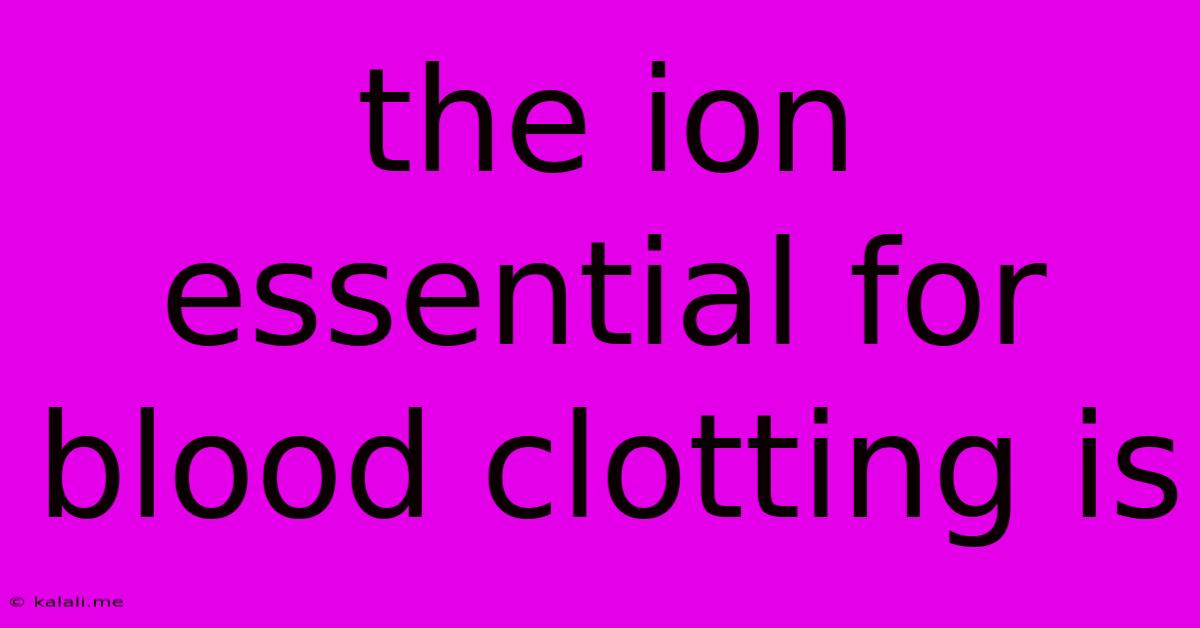The Ion Essential For Blood Clotting Is
Kalali
Jun 14, 2025 · 3 min read

Table of Contents
The Ion Essential for Blood Clotting: Calcium's Crucial Role in Hemostasis
Blood clotting, also known as hemostasis, is a complex process crucial for preventing excessive bleeding after injury. This intricate cascade of events relies on a variety of factors, but one ion stands out as absolutely essential: calcium (Ca²⁺). Without sufficient calcium ions, the blood clotting process would fail, leading to potentially life-threatening hemorrhage. This article will explore the vital role calcium plays in this critical physiological mechanism.
Understanding the Blood Clotting Cascade
The blood clotting cascade is a precisely orchestrated series of enzymatic reactions. It's often divided into three main stages:
-
Initiation: This stage begins with the activation of factor VII by tissue factor (TF), exposed at the site of injury. This interaction triggers a chain reaction.
-
Amplification: The initial activation leads to a rapid amplification of the clotting process, involving the activation of more clotting factors.
-
Propagation: This final stage culminates in the formation of a stable fibrin clot, which seals the damaged blood vessel and stops bleeding. This involves the conversion of fibrinogen to fibrin, a process crucial for clot formation.
Calcium's Multifaceted Role in Coagulation
Calcium ions act as a crucial cofactor at several points throughout the coagulation cascade. Its presence is essential for the proper assembly and function of several coagulation complexes. These complexes are essentially groups of proteins that interact to catalyze specific steps in the clotting process.
Specifically, calcium ions are necessary for:
-
The assembly of the tenase and prothrombinase complexes: These complexes are essential for the activation of factors X and II (prothrombin), respectively. Calcium bridges the interaction between these factors and phospholipid membranes, creating the active complexes.
-
The activation of factor XIII: This factor is responsible for cross-linking fibrin molecules, leading to the formation of a stable, insoluble fibrin clot. This cross-linking is crucial for clot strength and integrity.
-
The binding of clotting factors to phospholipid surfaces: Many coagulation factors require binding to negatively charged phospholipid surfaces for optimal activity. Calcium ions mediate this binding, bringing the factors into close proximity to facilitate their interactions.
Consequences of Calcium Deficiency on Blood Clotting
A deficiency in calcium ions, whether due to dietary insufficiency or underlying medical conditions like hypoparathyroidism, can significantly impair the blood clotting process. This can manifest as:
-
Increased bleeding time: The time it takes for bleeding to stop after an injury is significantly prolonged.
-
Easy bruising: Minor trauma can lead to extensive bruising due to impaired clot formation.
-
Excessive bleeding from wounds: Even small cuts and scrapes can bleed profusely and for an extended period.
-
Spontaneous bleeding: In severe cases, spontaneous bleeding can occur without any apparent trauma.
Conclusion: Calcium – A Vital Component of Hemostasis
In conclusion, calcium ions are unequivocally essential for normal blood clotting. Their role as a critical cofactor in several key steps of the coagulation cascade underscores their vital contribution to hemostasis. Without adequate calcium levels, the body's ability to stop bleeding is severely compromised, highlighting the significance of maintaining appropriate calcium intake and addressing any underlying conditions that may lead to calcium deficiency. Understanding this fundamental role helps appreciate the complexity and precision of the body's natural defense against blood loss.
Latest Posts
Latest Posts
-
How Many Valence Electrons Do Semiconductors Have
Jun 15, 2025
-
All Of The Following Are Examples Of Video Conferencing Systems Except
Jun 15, 2025
-
Lcm Of 7 4 And 3
Jun 15, 2025
-
Gpa Requirements For Stony Brook University
Jun 15, 2025
-
Which Of Daltons Postulates Were Incorrect
Jun 15, 2025
Related Post
Thank you for visiting our website which covers about The Ion Essential For Blood Clotting Is . We hope the information provided has been useful to you. Feel free to contact us if you have any questions or need further assistance. See you next time and don't miss to bookmark.